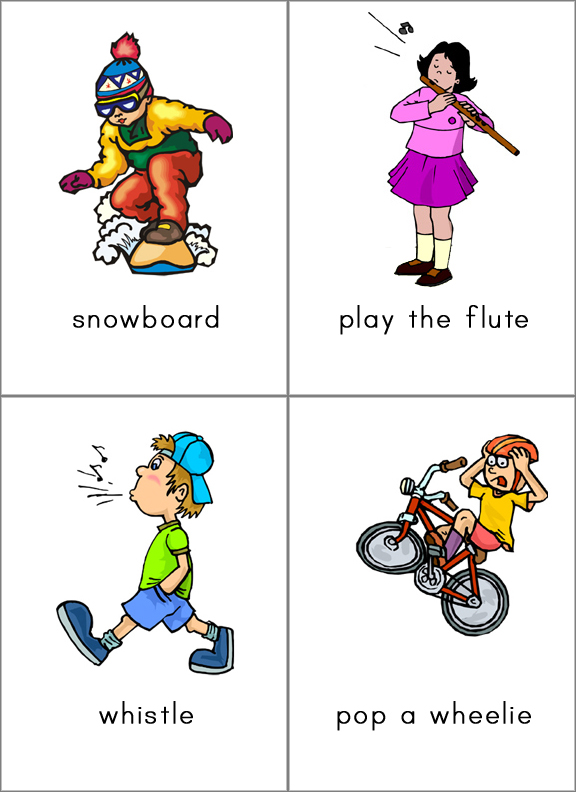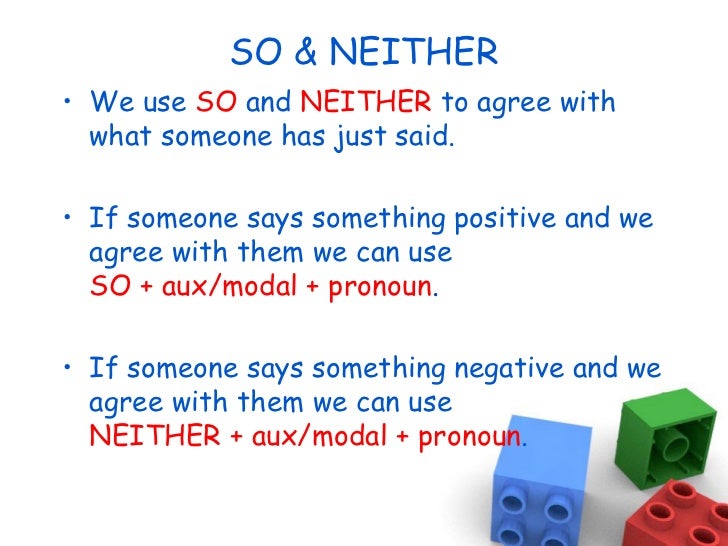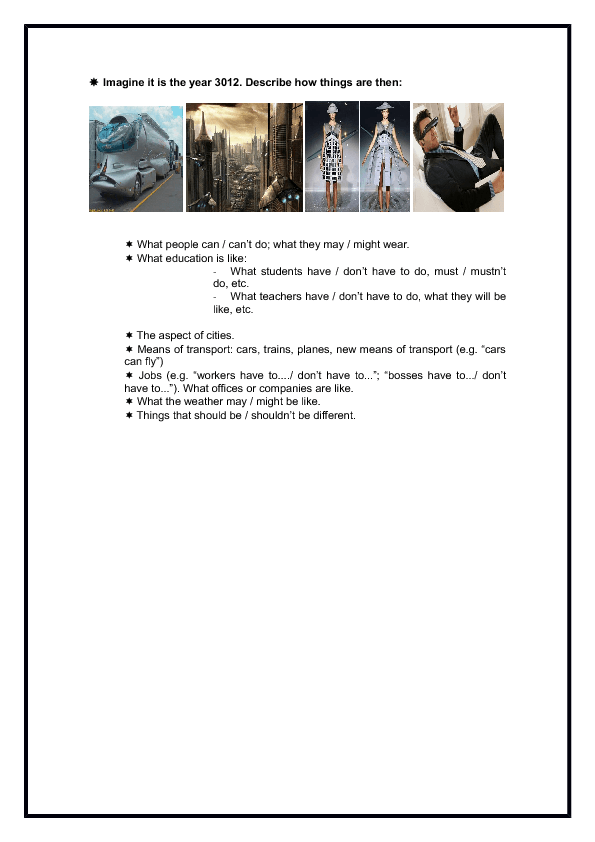Modal verbs are are the bread and butter of each grammar class. Students encounter them in any respect levels, from basis to proficiency. In C-level classes, college students ought to be capable to recall each kind of modal verbs and determine what job they do. Modal verbs can signify ability, probability, advice, request, permission, prohibition, obligation, certainty, and possibility.
Of course, educating college college college students about all 9 of those classes in a single session could be like consuming water from a firehose. So I've furnished three getting to know routine aimed to interact C-level college college college students and develop their fluency of modals of possibility. It's imperative that college college college students are built with helpful phrases, expressions that they'll really use. Modals/ modal verbs/ modal auxiliary verbs are a exotic sort of verbs current in English grammar. These verbs are used irregularly in English grammar. Uses of modal verbs in English grammar contains presenting additional details concerning the motion of the primary verb.
Some modals would be utilized for multiple function (such as might for previous capability or present/future possibility), so it's no marvel they often struggle! Presenting modals by perform might actually aid English language learners preserve all of them straight. These auxiliaries exhibit obligation, possibilities, permission or capability in a sentence by including intending to the principle verb. As per modal verbs rules, the spelling or kind don't change, in contrast to different verbs. Before we commence researching the right way to make use of modal verbs, let's check out what modal verbs are.
According tothis article from Grammarly, modal verbs are categorized as auxiliary verbs. "Auxiliary verbs" are assisting verbs, which suggests you employ them with different verbs in your sentences. Modals (can, will, should, etc.), additionally called modal auxiliaries, are troublesome to study considering they appear to operate like a verb however don't comply with the identical rules. We will study the forms, meaning, and use of modals in additional depth. In many Germanic languages, the modal verbs can be utilized in additional capabilities than in English.
In German, for instance, modals can show up as non-finite verbs, which suggests they are often subordinate to different verbs in verb catenae; they needn't seem because the clause root. In Swedish, some modal verbs have infinitive forms. This as an example allows catenae containing a number of modal auxiliaries. The modal verbs are underlined within the next table. If, however, one defines modal verb solely when it comes to which means contribution, then these different verbs would even be modals and so the listing right here must be drastically expanded.
In English, the modal verbs are used to precise ability, possibility, permission or obligation. Each one among several modal verbs could be utilized to precise a number of of those modalities. They could be used to kind the longer term tense in English and to make conditional sentences. Modal verbs are, essentially, auxiliary verbs, or assisting verbs, as they're additionally called.
However, possibly the easiest method to suppose about modal verbs is as verbs that modify the which means of the principle verb. Modal verbs are auxiliary verbs, additionally called supporting verbs. They work with different verbs to point out varied conditions, resembling probability or necessity.
Where To Use Modals Modal verbs don't change kind dependent on the verb tense of the sentence; they don't have conjugated forms. Modals are a half of a verb phrase; they provide extra details concerning the primary verb by qualifying it in some way. Modals additionally affect the grammar of the verb phrase; after a modal, the infinitive kind is used. Some modals may be utilized with diverse time references, present, previous or future; others are restricted to at least one or two time frames. Some modals may be utilized in unfavourable expressions, others cannot, and every now and then when utilized in a unfavourable expression the utilization changes. The chart under summarizes the time frames which might be manageable with the modals and their commonest usages.
Modal verbs are helping/auxiliary verbs that give further details concerning the perform of the primary verb that follows. They show attitudes resembling ability, possibility, permission, and suggestion. In this month's Teacher's Corner, we current 4 pursuits that target the form, meaning, and use of modals in on a regular basis English. The endeavor supplied in Week 1 makes use of widely used classroom directions to assist learners differentiate between modals expressing necessity and people expressing possibility. Week 2 offers learners an opportunity to acknowledge equal wide-spread and phrasal modals. In Week three an endeavor explains ways to show a standard speech act.
We finish the month with a standard icebreaker endeavor tailored to emphasise modals. It may be utilized to converse about potential and permission within the past. Also, similar to the modal verb "can", the modal verb "could" may be utilized to make questions, requests, strategies or offers, however in a extra nicely mannered way. It may be used to converse about possibilities, however not as robust risk that the one expressed with "can". And, as we've already said, modal verbs open up a complete new approach of talking and writing with their potential to in a timely fashion change the which means of a verb and a sentence. Also, some questions may be thought of rude if not requested employing a modal verb, so there's that to reflect on as well.
Could are modal auxiliary verbs that categorical an ability, permission, request, provide or opportunity. In this article, we'll discover the variations between canandcould, and the option to make use of each. In this week's Teacher's Corner, scholars work collectively to rewrite sentences that use both straightforward or phrasal modals. This recreation is an effective option to attract consideration to modals, to their totally diverse forms, and to how these totally diverse types can create slight variations in meanings. The major use of the modal verb "will" is to kind the longer term sort of the verbs in English.
When speaking about calls for and requests, using will generally is not really as well mannered as different modal verbs. Shall is a phrase that's utilized in England to precise a future promise and to type an easy current for I and we. It's generally utilized in formal and authorized conditions within the United States to type well mannered questions that contain a well mannered request for permission. It may even be used to supply assistance, make suggestions, or ask for advice.
There are a large selection of modal auxiliary and their function. So, let's waste no extra time and start the training journey. Modal Auxiliary Use Modal Auxiliary + Main Verb can Expresses a capability or likelihood I can raise this forty-pound box. Could Expresses a capability within the past; a gift possibility; a previous or future permission I might beat you at chess as soon as we have been kids. May Expresses unsure future action; permission; ask a yes-no query I might attend the concert.
Should Expresses obligation; ask if an obligation exists I must mail my RSVP. Will Expresses meant future action; ask a favor; ask for facts I will get an A on this class. Would States a preference; request a alternative politely; clarify an action; introduce recurring previous actions I would really just like the steak, please. I would go together with you if I didn't must babysit tonight. He would write to me each week once we have been dating.
Must Expresses obligation We have to be on time for class. Ought to Expresses obligation I ought to mail my RSVP. Modal verbs present intention, instead of action. When used with different verbs within the sentence, they could make your which means as clear as you wish it to be.
Test your expertise of modal verbs with an examination of could vs. might. You could be certain that you're employing can vs. might appropriately in your writing and daily speech. In English grammar, a modal is a verb that mixes with one different verb to point temper or tense.
A modal, additionally called a modal auxiliary or modal verb, expresses necessity, uncertainty, possibility, or permission. As you've seen on this article, modal verbs are helpful on the subject of expressing ideas and making well mannered requests. They're wonderful versatile, and additionally you may use them in all types of situations.However, just remember to don't use too many modal verbs in your conversations. Similar to when you're making a request, modal verbs can change your sentence from a press release to a question. That immediately makes your sentence sound extra well mannered as a result of it's not being introduced as a demand. Modals categorical possibility, ability, prediction, permission, and necessity.
A modal verb is a sort of verb that contextually shows a modality comparable to a likelihood, ability, permission, request, capacity, suggestion, order, obligation, or advice. Modal verbs all the time accompany the bottom sort of one more verb having semantic content. In English, the modal verbs frequently used are can, could, may, might, shall, should, will, would, and must. As a modal verb, "should" has many critical makes use of within the English language.
It's used to provide advice, to precise what's right, and to advocate an action. Also, it's used to make predictions, however ones which might be extra unclear than these with the opposite modal verbs. The modal 'can' is a frequently used modal verb in English.
It is used to express; ability, opportunity, a request, to grant permission, to point out probability or impossibility. It is that this great quantity of features and the truth that 'can' is changed by different modals when it can be used to precise future or previous time that always cause selected errors. Modal verbs point out possibility, obligation or ability. Find out how your youngster can be taught about modal verbs in grammar tuition in KS2 and the sorts of things to do they could be requested to full within the primary-school classroom.
In educational writing, modal verbs are most often used to point logical probability and least incessantly used to point permission. Eight modal verbs are listed underneath every of the features they will carry out in educational writing, and are ordered from strongest to weakest for every function. Notice that the identical modal can have totally diverse strengths when it's used for various features (e.g., could or can). In definitions, it can be known as a serving to verb. There are particular modal verbs guidelines that encircle their use.
It will be very effective if one can be taught the principles and use of modal verbs as this could assist you make grammatically right English sentences. You could have heard auxiliary verbs often called supporting verbs, however what's any such verb, and what does it do in English? When we are saying this is "helping" a essential verb, we imply this is supporting to make clear it.
Explore what auxiliary verbs are and the way they're utilized in English. Modal verbs are additionally referred to as auxiliary verbs or "helping" verbs. We use them together with a essential verb to precise suggestions like possibility, obligation, and permission. "Ought" might be the only of this set of modal verbs.
It's nearly continuously observed by "to" and the infinitive kind of a verb. It means the identical factor as "should," and is utilized within the identical ways, besides the fact that "ought" is much less commonplace and a bit extra formal. A few examples of "ought" are "We must be residence by noon," which suggests "I anticipate that we'll be residence by noon," and "I must repair that," which suggests "I ought to repair that."
An extension to this endeavor may have scholars writing their very very own sentences employing user-friendly or phrasal modals as they choose. Walk right into a classroom within the United States, and you'll see a wide range of posters stating completely different classroom guidelines and directions for students. Some of those posters may embrace phrases akin to increase hand to talk or don't interrupt one more student. Even if there are not any posters, most academics have an inventory of classroom guidelines and instructions. These guidelines are often written as brief phrases with no modals; however, a modal remains to be implied.
Hawaiian Pidgin is a creole language most of whose vocabulary, however not grammar, is drawn from English. As is usually the case with creole languages, it can be an isolating language and modality is usually indicated by means of invariant pre-verbal auxiliaries. The invariance of the modal auxiliaries to person, number, and tense makes them analogous to modal auxiliaries in English. However, as in most creoles the primary verbs are additionally invariant; the auxiliaries are distinguished by their use together with a fundamental verb.
-,gamōtmaymögen, magmogen, magmögen, magmeie, meimagmå(må)mega, mámagum, magwissen, weißweten, weet? Witte, witweetvedvetvita, veitwitum, wait(tharf)dürfen, darfdurven, durfdörven, dörvdoarre, doardurf? Þaúrbum, þarfThe English would possibly is the preterite kind of can; ought to is the preterite of shall; would possibly is the preterite of may; and have to was initially the preterite kind of mote. (This is ignoring using "may" as a vestige of the subjunctive temper in English.) These verbs have acquired an independent, current tense meaning.
The German verb möchten is usually taught as a vocabulary phrase and included within the record of modal verbs, nevertheless it really is really the previous subjunctive kind of mögen. You can even use modal verbs of necessity in crucial sentences. Must and will are frequently located when a speaker offers counsel or makes commands.
Some audio system add can to this list, as in "Can I spend the night time at David's house? " Strict grammarians feel which will is the correct modal verb to make use of in these cases, as can is historically a modal of ability. However, the principles concerning can vs. could have loosened as much as permit can as a modal of permission in casual cases. Modal verbs are a significant section of English grammar.
They're very versatile, and also you may use them in lots of various situations. If you discovered newbie English grammar in faculty or with a language teacher, you almost certainly already discovered about a few of those modal verbs and when to make use of them. One technique to differ this recreation is to make the most of a analyzing that you've until now utilized in class. Modify half of the analyzing to make use of basic modals and the opposite half of the analyzing to make use of solely phrasal modals. Students might be acquainted with the fabric and vocabulary, making it less difficult for them to concentrate on analyzing the variations in which means between the 2 varieties of modals. Some regulations within the classroom are compulsory and others differ from sturdy to weak suggestions.


























